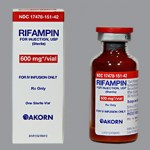(Note: Rifampin is also available under the brand name Rifater in combination with Isonazid and Pyrazinamide.)
- Type of Drug: Antitubercular.
- Prescribed for: Tuberculosis and many other infections.
Rifampin (Rifadin) General Information
Rifampin is an important agent in the treatment of tuberculosis. It is always used in combination with at least one other tuberculosis drug because it is not effective alone. It is also used to eradicate the organism that causes meningitis in people who are carriers; although these individuals are not infected themselves, they carry the organism and can spread it to others. Rifampin may also be prescribed for staphylococcal infections of the skin, bones, or prostate; for Legionnaire’s disease (when Erythromycin does not work); for leprosy; and to prevent meningitis caused by Haemophilus influenzae, common among children in day care.
Cautions and Warnings
Do not take this drug if you are allergic to it or to Rifabutin (prescribed for Mycobacterium avium complex [MAC], an infection commonly associated with advanced cases of AIDS). Liver damage and death have been reported in people taking this drug; people taking other drugs that may cause liver damage should also avoid Rifampin. People with liver disease need to be carefully monitored by their doctors and should take a reduced dosage of Rifampin.
Bacterial resistance develops very quickly if Rifampin is used for meningococcus infection. It should not be used for this purpose.
A few cases of accelerated lung cancer growth have been reported, but a link to Rifampin use is not established. This drug has the potential to suppress the immune system in people and animals.
Rifampin (Rifadin) Possible Side Effects
- Most common: flu-like symptoms, heartburn, upset stomach, appetite loss, nausea, vomiting, stomach gas, cramps, diarrhea, headache, drowsiness, tiredness, menstrual disturbances, dizziness, fever, pains in the arms and legs, confusion, visual disturbances, numbness, and hypersensitivity to the drug.
- Less common: effects on the blood, kidneys, or liver.
Drug Interactions
• Severe liver damage may develop when Rifampin is mixed with other drugs that cause liver toxicity.
• Rifampin may increase your need for oral anticoagulant (blood-thinning) drugs and may also affect angiotensin-converting-enzyme (ACE) inhibitor drugs (especially Enalapril), Acetaminophen, oral antidiabetes drugs, barbiturates, benzodiazepine tranquilizers, beta blockers, Chloramphenicol, Clofibrate, corticosteroids, Cyclosporine, digitalis drugs, Disopyramide. Estrogens, Phenytoin, Methadone, Mexiletine, Quinidine, sulfa drugs, theophylline drugs, Tocainide, and Verapamil.
• Women taking birth control pills should use another contraceptive method while taking Rifampin.
Rifampin (Rifadin) Food Interactions
Take this medicine 1 hour before or 2 hours after a meal, at the same time every day.
Usual Dose
Adult: 600 mg once daily.
Child: 4.5 to 9 mg per pound of body weight, up to 600 mg per day.
Overdosage
Signs of overdosage are nausea, vomiting, and tiredness; with severe liver damage, unconsciousness may develop. Brown-red or orange skin discoloration may develop. Rifampin overdose victims must be taken to a hospital emergency room at once. ALWAYS take the medicine bottle.
Rifampin (Rifadin) Special Information
This drug may cause a red-brown or orange discoloration of the urine, stool, saliva, sweat, and tears; this is not harmful. Soft contact lenses may become permanently stained.
Call your doctor if you develop flu-like symptoms, fever, chills, muscle pains, headache, tiredness or weakness, loss of appetite, nausea, vomiting, sore throat, unusual bleeding or bruising, yellow discoloration of the skin or eyes, or skin rash or itching.
If you take Rifampin once a day and miss a dose, take it as soon as you remember. If it is almost time for your next dose, skip the missed dose and continue with your regular schedule. Do not take a double dose. Regularly skipping doses of Rifampin increases your chances for drug side effects.
Rifampin (Rifadin) Special Populations
Pregnancy/Breast-feeding
Animal studies indicate that Rifampin may cause cleft palate and spina bifida (backbone problems) in the fetus. Pregnant women should use this drug only if absolutely necessary.
Nursing mothers taking Rifampin should bottle-feed their babies.
Seniors
Older adults with severe liver disease may be more sensitive to the effects of this drug. Report any side effects at once.

